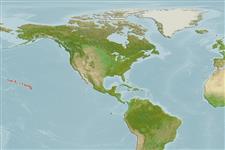Environment: milieu / climate zone / depth range / distribution range
Ecology
Marine; reef-associated; non-migratory; depth range 1 - 50 m (Ref. 10482). Tropical
Eastern Central Pacific: restricted to the Hawaiian Islands and Johnston islands.
Size / Weight / Age
Maturity: Lm ? range ? - ? cm
Max length : 16.5 cm TL male/unsexed; (Ref. 3921)
Dorsal spines (total): 13; Dorsal soft rays (total): 9; Anal spines: 3; Anal soft rays: 5. Large pectoral fin, upper rays branched distally; dorsal fin spines longer than 1/2 body depth, membranes deeply incised. Scales ctenoid with about 50-55 vertical scale rows. Coronal spines present; some branching of head spines in large specimens. Suborbital ridge a single row of spines, not as broad patch of tiny spinules. Supraocular tentacle when present short, less than orbit diameter and usually absent; without black band.
Found under ledges in turbid lagoons and clear seaward reefs (Ref. 9710). Collected in depths from near shore to about 50 meters (Ref. 10482). Benthic in crevices and caves during day, or sometimes benthopelagic at night, at 1-134 m (Ref. 58302).
Life cycle and mating behavior
Maturities | Reproduction | Spawnings | Egg(s) | Fecundities | Larvae
Randall, J.E., 1985. Guide to Hawaiian reef fishes. Harrowood Books, Newtown Square, PA 19073, USA. 74 p. (Ref. 3921)
IUCN Red List Status (Ref. 130435)
Threat to humans
Venomous
Human uses
Fisheries: commercial; aquarium: commercial
Tools
Special reports
Download XML
Internet sources
Estimates based on models
Preferred temperature (Ref.
123201): 24.2 - 28.4, mean 25.2 °C (based on 62 cells).
Phylogenetic diversity index (Ref.
82804): PD
50 = 0.5078 [Uniqueness, from 0.5 = low to 2.0 = high].
Bayesian length-weight: a=0.01023 (0.00444 - 0.02358), b=3.01 (2.82 - 3.20), in cm total length, based on LWR estimates for this (Sub)family-body shape (Ref.
93245).
Trophic level (Ref.
69278): 4.2 ±0.73 se; based on food items.
Resilience (Ref.
120179): Medium, minimum population doubling time 1.4 - 4.4 years (Preliminary K or Fecundity.).
Fishing Vulnerability (Ref.
59153): Low vulnerability (10 of 100).
Nutrients (Ref.
124155): Calcium = 76.3 [40.5, 158.2] mg/100g; Iron = 0.735 [0.376, 1.792] mg/100g; Protein = 18.2 [16.2, 20.2] %; Omega3 = 0.241 [0.102, 0.676] g/100g; Selenium = 24.2 [12.6, 61.5] μg/100g; VitaminA = 265 [89, 755] μg/100g; Zinc = 1.24 [0.82, 1.85] mg/100g (wet weight);
